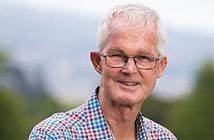DairyNZ chief executive Tim Mackle has reconfirmed the dairy sector’s commitment to play its part to reduce its biological emissions, and supports the intent of the direction of the Zero Carbon Bill.
Our farmers are committed to sustainable farming practices, and need long-term certainty to make business decisions based on reduction targets. We are pleased the Government has listened to the science regarding the short-lived nature of methane, recognising it has a different impact on the environment,” says Dr Mackle.
“DairyNZ supports a science-based approach, where each gas is reduced based on its warming impact. We have not yet seen the Government’s analysis behind the 2050 target range. The 2050 target, of reducing methane by 24 to 47 percent, is based on global scenarios that are not grounded in the New Zealand context. This range for methane, combined with reducing nitrous oxide to net zero, goes beyond expert scientific advice for what is necessary for New Zealand agriculture to limit global warming to no more than at 1.5° C.
“It is very important to get the range right. If we get this wrong it will have significant impacts on not just the dairy sector, but the economic, social and cultural wellbeing of New Zealand.
“While we can support much of what is in the Zero Carbon legislation, we will be pushing for the range to be reviewed and aligned with the recommendations made by the Parliamentary Commissioner for the Environment, of 10-22 percent reduction in methane. When combined with our commitment on nitrous oxide to net zero, this is an equitable, yet ambitious and challenging target, that is grounded in robust science.
“We know our farmers will be concerned by the 47 percent and what that might mean for their livelihoods. It is not set in stone, and the Bill includes a number of criteria for review including availability of mitigation options, what other countries are doing, and reduction efforts by other sectors.
“New Zealand is already one of the lowest emissions producers of dairy nutrition in the world per kilogram of milksolids and we want to build on that advantage. Climate change is a global issue and it is good for the world if dairy production stays in New Zealand where we have low emissions for the amount we produce. We believe our premium, grass-based, high nutrition dairy will continue to be in demand well into the future, alongside a range of other options consumers may have.
“The 2030 reduction target is the first step, which we know will be very challenging. But there is action that farmers can take, and are already taking, to reduce on-farm emissions. The first step is to understand their emissions and where they come from. As part of our pan-sector Dairy Tomorrow strategy, over the next 5 years each farm will have a farm-specific plan to manage and reduce these emissions.
“DairyNZ remains focused on researching and developing tools to help farmers make choices for how to reduce emissions – through farm systems changes and new technologies. It will take time for some of these tools to develop. We will continue working closely with government to ensure all efforts on farm are recognised, and expert advice and training is made available. This support is a vital part of a fair transition.






